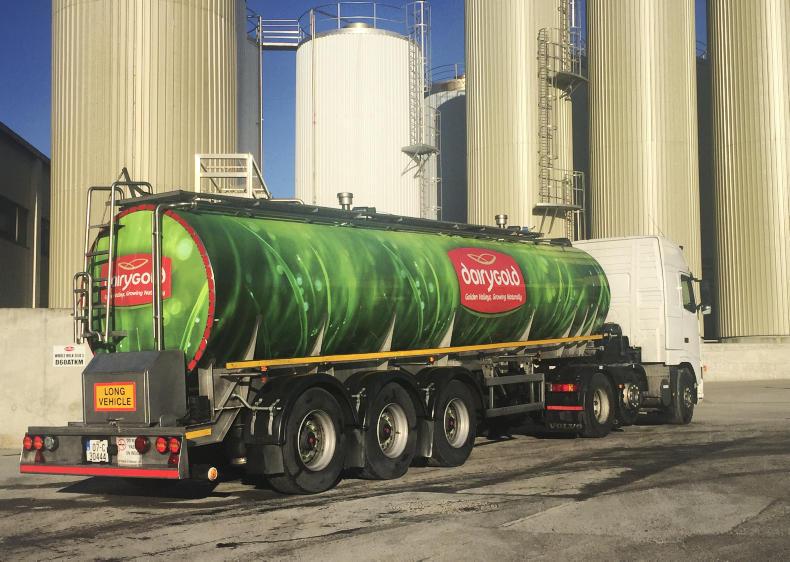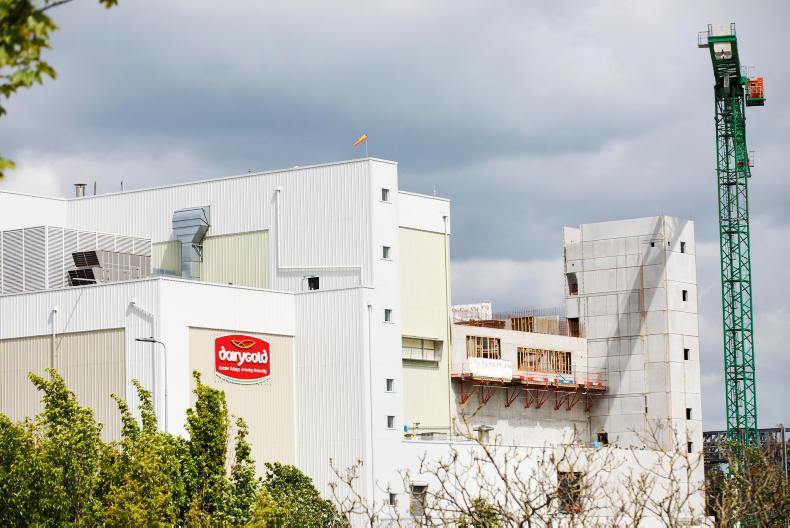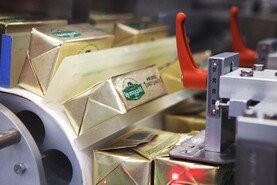The COVID-19 pandemic couldn’t have hit at a worse time for Ireland’s dairy industry, according to Dairygold CEO Jim Woulfe.
Speaking to the Irish Farmers Journal this week, Woulfe says peak milk supply in Ireland is going to coincide with the peak number of COVID-19 cases in Ireland, which poses huge risks to the milk processing sector and could cause huge disruption at milk plants.
The wiggle room is little or none
“Every measure is being taken to mitigate the problem but the risk for Dairygold is that we’ll peak at 46m litres of milk this year for a number of weeks. The wiggle room is little or none. I can’t predict there will be a problem but there’s a very serious risk,” said Woulfe.
Working collectively
The Dairygold boss said the dairy industry is working collectively like never before to try and avoid any disruption at milk processing sites with operational staff liaising with their counterparts in other co-ops.
What has happened to dairy markets in the last month is hard to envisage
Collecting farmers’ milk and keeping staff healthy and well are the key priorities for the co-op, added Woulfe.
“Getting over the peak is the first challenge. The next major challenge is the market. What has happened to dairy markets in the last month is hard to envisage.
We came into 2020 with optimism that dairy markets were in a good place. But the reality is that it’s inevitable there will be milk price adjustments to reflect the turmoil that’s out there
“Foodservice has fallen off a cliff and milk powder markets have taken the brunt of the uncertainty, with skimmed milk powder (SMP) prices down €500/t in just three weeks. The one positive is that cheese prices haven’t been as impacted,” said Woulfe.
“I’m not trying to talk down the market. We came into 2020 with optimism that dairy markets were in a good place. But the reality is that it’s inevitable there will be milk price adjustments to reflect the turmoil that’s out there at the moment,” he added.

New Dairygold milk tankers.
Woulfe called on the EU to intervene with support measures like private storage aid to help support dairy markets during this crisis. According to Dairygold chair John O’Gorman, the biggest concern he’s hearing from milk suppliers is whether milk would still be collected, while milk price was the second-biggest worry for farmers.
Dairygold sales break €1bn as milk production hits 1.4bn litres
Last year proved to be a strong financial year for Dairygold as the co-op recorded double-digit profit growth to €36m and broke the €1bn milestone in terms of annual sales. Milk supply continued to grow for the co-op, with Dairygold’s 2,750 milk suppliers increasing production last year by a further 50m litres (+4% year on year) to a record 1.4bn litres.
Looking back on the last decade, Dairygold’s milk supply has grown by a massive 65%, or 550m litres, from where it was in 2009. During that same period, milk solids supplied by farmers has increased by 75%, reflecting the significant gains made in dairy breeding and efficiency.
The co-op’s dairy ingredients business, which comprises sales of milk powders, cheese and butter, saw its sales grow by 5% last year to €601m
The growth in milk supply helped Dairygold increase its turnover by 3% last year to a record €1.02bn. The co-op’s dairy ingredients business, which comprises sales of milk powders, cheese and butter, saw its sales grow by 5% last year to €601m.
Dairygold’s cheese business in the UK and Germany saw sales fall by 4% last year to €149m. This was mostly related to the loss of some contracts in the UK where certain customers wanted to buy UK-only cheese after Brexit. Despite this, Dairygold’s overseas businesses performed well from a profit perspective.
Sales in the agribusiness division fell 7% last year to just under €245m, reflecting the significant improvement in weather last year and consequently the reduced demand for animal feed.
The co-op also saw increased revenues from non-core assets and investments to €26.4m last year. This was mainly as a result of the sale of its site at Trinity Quarter in Cork city to UCC for €17.2m, as well as the sale of other properties in Midleton and the Netherlands.

New production facilities being built at the Dairygold plant in Mallow, Co Cork.
Overall, Dairygold recorded double-digit growth in profits last year thanks to a very strong finish to the year. The co-op’s operating profits grew by 24% in 2019 to just under €36m, as operating profit margins widened from 2.9% in 2018 to a healthy 3.5% last year. Earnings (EBITDA) grew by 16% last year to €56.6m, while profit before tax and investment income rose by 26% to just over €30.7m.
Dairygold paid an average milk price of 34.6c/litre last year based on average solids of 3.6% protein and 4.2% fat
Dairygold CEO Jim Woulfe said the final months of 2019 really delivered the year for the co-op as dairy markets came right and strengthened considerably, especially for milk powders. This allowed the co-op to pay milk suppliers a year-end bonus of 0.5c/litre, which amounted to a total payout of €7m. Including this bonus, Dairygold paid an average milk price of 34.6c/litre last year based on average solids of 3.6% protein and 4.2% fat.
Debt
On the whole, Dairygold delivered a strong financial performance in 2019 and the net asset value of the co-op has increased to €373m, which was mostly driven by profits.
However, Dairygold’s net bank debt level grew by more than 40% last year to €158m, reflecting the significant capital investments the co-op has had to make to handle the surge in milk supply since the end of quotas.
In 2019 alone, between cash and debt finance, Dairygold invested almost €85m in capital expenditure
As a result, the co-op’s net debt to earnings ratio has risen to 2.8 times, which is still inside its banking covenants.
Over the last decade, Dairygold, in conjunction with its strategic partners, has invested in excess of €400m in expanding processing capacity. In 2019 alone, between cash and debt finance, Dairygold invested almost €85m in capital expenditure.
The co-op has now concluded the second phase of its post-quota investment programme, which will give Dairygold enough processing capacity to get it to 2023 without any further capital projects. The co-op is currently processing the results of a recent census that it issued to milk suppliers to get a more accurate feel for future growth in milk supply. Dairygold says the key consideration from this census will be how future capacity expansion is funded and to what level.
The COVID-19 pandemic couldn’t have hit at a worse time for Ireland’s dairy industry, according to Dairygold CEO Jim Woulfe.
Speaking to the Irish Farmers Journal this week, Woulfe says peak milk supply in Ireland is going to coincide with the peak number of COVID-19 cases in Ireland, which poses huge risks to the milk processing sector and could cause huge disruption at milk plants.
The wiggle room is little or none
“Every measure is being taken to mitigate the problem but the risk for Dairygold is that we’ll peak at 46m litres of milk this year for a number of weeks. The wiggle room is little or none. I can’t predict there will be a problem but there’s a very serious risk,” said Woulfe.
Working collectively
The Dairygold boss said the dairy industry is working collectively like never before to try and avoid any disruption at milk processing sites with operational staff liaising with their counterparts in other co-ops.
What has happened to dairy markets in the last month is hard to envisage
Collecting farmers’ milk and keeping staff healthy and well are the key priorities for the co-op, added Woulfe.
“Getting over the peak is the first challenge. The next major challenge is the market. What has happened to dairy markets in the last month is hard to envisage.
We came into 2020 with optimism that dairy markets were in a good place. But the reality is that it’s inevitable there will be milk price adjustments to reflect the turmoil that’s out there
“Foodservice has fallen off a cliff and milk powder markets have taken the brunt of the uncertainty, with skimmed milk powder (SMP) prices down €500/t in just three weeks. The one positive is that cheese prices haven’t been as impacted,” said Woulfe.
“I’m not trying to talk down the market. We came into 2020 with optimism that dairy markets were in a good place. But the reality is that it’s inevitable there will be milk price adjustments to reflect the turmoil that’s out there at the moment,” he added.

New Dairygold milk tankers.
Woulfe called on the EU to intervene with support measures like private storage aid to help support dairy markets during this crisis. According to Dairygold chair John O’Gorman, the biggest concern he’s hearing from milk suppliers is whether milk would still be collected, while milk price was the second-biggest worry for farmers.
Dairygold sales break €1bn as milk production hits 1.4bn litres
Last year proved to be a strong financial year for Dairygold as the co-op recorded double-digit profit growth to €36m and broke the €1bn milestone in terms of annual sales. Milk supply continued to grow for the co-op, with Dairygold’s 2,750 milk suppliers increasing production last year by a further 50m litres (+4% year on year) to a record 1.4bn litres.
Looking back on the last decade, Dairygold’s milk supply has grown by a massive 65%, or 550m litres, from where it was in 2009. During that same period, milk solids supplied by farmers has increased by 75%, reflecting the significant gains made in dairy breeding and efficiency.
The co-op’s dairy ingredients business, which comprises sales of milk powders, cheese and butter, saw its sales grow by 5% last year to €601m
The growth in milk supply helped Dairygold increase its turnover by 3% last year to a record €1.02bn. The co-op’s dairy ingredients business, which comprises sales of milk powders, cheese and butter, saw its sales grow by 5% last year to €601m.
Dairygold’s cheese business in the UK and Germany saw sales fall by 4% last year to €149m. This was mostly related to the loss of some contracts in the UK where certain customers wanted to buy UK-only cheese after Brexit. Despite this, Dairygold’s overseas businesses performed well from a profit perspective.
Sales in the agribusiness division fell 7% last year to just under €245m, reflecting the significant improvement in weather last year and consequently the reduced demand for animal feed.
The co-op also saw increased revenues from non-core assets and investments to €26.4m last year. This was mainly as a result of the sale of its site at Trinity Quarter in Cork city to UCC for €17.2m, as well as the sale of other properties in Midleton and the Netherlands.

New production facilities being built at the Dairygold plant in Mallow, Co Cork.
Overall, Dairygold recorded double-digit growth in profits last year thanks to a very strong finish to the year. The co-op’s operating profits grew by 24% in 2019 to just under €36m, as operating profit margins widened from 2.9% in 2018 to a healthy 3.5% last year. Earnings (EBITDA) grew by 16% last year to €56.6m, while profit before tax and investment income rose by 26% to just over €30.7m.
Dairygold paid an average milk price of 34.6c/litre last year based on average solids of 3.6% protein and 4.2% fat
Dairygold CEO Jim Woulfe said the final months of 2019 really delivered the year for the co-op as dairy markets came right and strengthened considerably, especially for milk powders. This allowed the co-op to pay milk suppliers a year-end bonus of 0.5c/litre, which amounted to a total payout of €7m. Including this bonus, Dairygold paid an average milk price of 34.6c/litre last year based on average solids of 3.6% protein and 4.2% fat.
Debt
On the whole, Dairygold delivered a strong financial performance in 2019 and the net asset value of the co-op has increased to €373m, which was mostly driven by profits.
However, Dairygold’s net bank debt level grew by more than 40% last year to €158m, reflecting the significant capital investments the co-op has had to make to handle the surge in milk supply since the end of quotas.
In 2019 alone, between cash and debt finance, Dairygold invested almost €85m in capital expenditure
As a result, the co-op’s net debt to earnings ratio has risen to 2.8 times, which is still inside its banking covenants.
Over the last decade, Dairygold, in conjunction with its strategic partners, has invested in excess of €400m in expanding processing capacity. In 2019 alone, between cash and debt finance, Dairygold invested almost €85m in capital expenditure.
The co-op has now concluded the second phase of its post-quota investment programme, which will give Dairygold enough processing capacity to get it to 2023 without any further capital projects. The co-op is currently processing the results of a recent census that it issued to milk suppliers to get a more accurate feel for future growth in milk supply. Dairygold says the key consideration from this census will be how future capacity expansion is funded and to what level.








 This is a subscriber-only article
This is a subscriber-only article










SHARING OPTIONS: